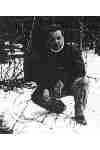
|
Borys Sydoruk, UCCLA representative in Calgary, Alberta examining Castle Mountain's barbed wire, November 1993. (Photo by L.Y. Luciuk) |
Recently, I joined hundreds of delegates at a national Ukrainian Canadian assembly in Winnipeg, expecting Prime Minister Brian Mulroney finally to announce government plans for acknowledging that the internment of thousands of Ukrainian Canadians as "enemy aliens" between 1914 and 1920 was unjust. We were disappointed.
Mulroney repeated the promise, first made in Edmonton in November, 1990, that he would work with the minister for multiculturalism, Gerry Weiner, to develop a mutually satisfactory redress package. But that was all. He knowingly wasted an ideal opportunity for securing community thanks and positive media coverage.
Why? It seems Ottawa is not prepared to offer any substantial financial compensation for the wrongs done to Ukrainian Canadians even if a recent Price Waterhouse study determined that the internees' financial losses amounted to many millions of dollars.
And so, despite many promises, this issue is no closer to being settled today than it was in October, 1988, when Weiner said it would be resolved "expeditiously." Some now insist the government is waiting for the upcoming federal election, hoping an announcement closer to voting day will swing the 1 million strong Ukrainian-Canadian community into the Tory camp. That may be so. I hope not. Such a partisan solution is crass and distasteful.
The community hoped raising this relatively unknown episode in Canadian history would ensure no other ethnic or religious minority would be subjected to the indignities Ukrainians suffered during World War I. They cannot be bribed away from that conviction.
So is there a solution to this conundrum which is mutually satisfactory? I believe so.
In December, 1990, Weiner told a Ukrainian-Canadian delegation a settlement could be negotiated if any redress proposal was "forward-looking and visionary," encouraged better understanding of our nation's past and helped combat discrimination. Given Canada's "bankruptcy," no large financial settlement would be possible. The government also wanted simultaneously to resolve the grievances of the Chinese and Italian Canadian communities.
But these groups, working together with Japanese Canadians in an umbrella organization known as the National Redress Alliance, have repeatedly stated that their individual claims must be dealt with separately. Any omnibus apology was, and remains, unacceptable.
For Canada's Ukrainians, however, what has always been most important was an acknowledgement in the House of Commons to record for posterity that the internment of Ukrainian Canadians was unwarranted. As well, historical markers must be erected at each campsite, remaining artifacts preserved and the graves of internees attended to.
At the Castle Mountain site, in Banff National Park, an interpretive display should be developed and maintained in memory to those Ukrainian Canadians who suffered there and in other concentration camps across the country.
No individual compensation is being sought, for few, if any, internees are alive. The community, based on the moral and legal precedent set by the Japanese Canadian Redress Agreement, did make a case for financial compensation - for wages lost, properties and valuables confiscated but never returned, for the 1917 disenfranchisement of thousands and the humiliation of being declared "enemy aliens" and then forced to carry identity papers and register periodically, all under threat of arrest.
But, however deserved monetary compensation may be, it cannot be realistically anticipated in today's Canada. Only an acknowledgement - not even an apology - and historical markers, are requested.
Who will erect those plaques? Parks Canada should but apparently won't. So, for the next 25 years, I propose every visitor to Banff National Park pay a modest surcharge to the admission price. Say 25 cents. They will receive a map leading to the Castle Mountain display, which will be sustained with funds collected at the gates of Banff, by people using roads and a park which Ukrainian-Canadian internee laborers helped build.
Some of the collected monies will be used to maintain historical markers at other sites. And a final percentage, the precise amount negotiable, can be held by the Ministry of Multiculturalism, earmarked for the use of Canadian academics, filmmakers and artists who wish to prepare educational materials on the Ukrainian experience. An expert panel of Ukrainian Canadians can help select projects worthy of support.
The federal government need not pay a single cent from coffers it says are empty if it wants to meet the terms of this redress proposal. In fact, the Prime Minister, the Leader of the Opposition and the Leader of the New Democratic Party need do nothing more than what their parties all agree they want to do, namely resolve this issue fairly. They can do that by standing together in the House of Commons and saying a few words that will help us all, as Canadians, remember and atone for an historical injustice done to a people who came to Canada seeking freedom.
That surely, is not too much to ask.
Lubomyr Luciuk, who teaches political geography at the Royal Military College of Canada, in Kingston, is director of research for the Ukrainian Canadian Civil Liberties Association.
![]() Return to Righting An Injustice Page
Return to Righting An Injustice Page
![]() Return to Internment of Ukrainians in Canada 1914-1920 Page
Return to Internment of Ukrainians in Canada 1914-1920 Page
![]() Return to Ukrainian History Page
Return to Ukrainian History Page
![]() Return to InfoUkes Home Page
Return to InfoUkes Home Page
Document URL: http://www.infoukes.com/history/internment/booklet02/doc-069.html
Copyright © 1994 Ukrainian Canadian Civil Liberties Association
Copyright © 1994 Lubomyr Luciuk
We acknowledge the help in the preparation of this document by Amanda Anderson
Page layout, design, integration, and maintenance by G.W. Kokodyniak and V. Pawlowsky
Copyright © 1996-1997 InfoUkes Inc.
E-mail: internment@infoukes.com
|
since Mar 1 1997 |
InfoUkes Inc. Suite 185, 3044 Bloor Street West Etobicoke, Ontario, Canada M8X 2Y8 Tel: (416) 236-4865 Fax: (416) 766-5704 |
Originally Composed: Tuesday December 3rd 1996.
Date last modified: Thursday October 30th 1997.